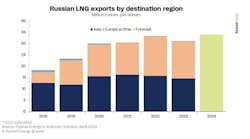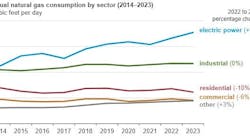Energy futures were mixed Tuesday as markets adjusted to the realities of daily demand after digesting US President Bill Clinton's move to release 30 million bbl of crude from the country's Strategic Petroleum Reserve.
The price of home heating oil�which the Clinton administration targeted in announcing the release of crude supplies�lost 1.08� to 92.99�/gal for November delivery on the New York Mercantile Exchange. But unleaded gasoline for the same month gained 0.3� to 93�/gal.
The November contract for benchmark US light, sweet crudes dipped 7� to $31.50/bbl on the NYMEX, while the December contract lost 6� to $31.37/bbl. But both oil contracts bounced back, climbing to $31.80/bbl and $31.63/bbl, respectively, in after-hours electronic trading because of a bullish inventory report by the American Petroleum Institute after the market closed.
Also on the NYMEX, natural gas for October delivery advanced by 4.8� to settle at $5.32/Mcf.
US crude stocks declined by 2.24 million bbl last week, while distillate stocks�including heating oil�were down by 761,000 bbl. However, gasoline stocks increased by 2.9 million bbl in the same period, API officials said.
In London on Tuesday, the November contract for North Sea Brent crude gained 18� to $30.42/bbl, despite expectations that a sell-off of gasoil futures could drag oil prices below $30/bbl in the International Petroleum Exchange.
In early trading Wednesday, Brent futures were reported up on a technical recovery after falling to nearly $30/bbl.
The October contract for natural gas was up 4� to the equivalent of $3.34/Mcf Tuesday on the IPE.
In overnight trading on the Singapore Exchange, the November Brent crude contract gained 18� to $30.42/bbl Wednesday, with the December contract up 32� to $30.67/bbl.
On the Tokyo Commodity Exchange, the Asian Petroleum Index for light, sweet crude rose 20� to $30.42/bbl.
US analysts say the bullish API report could trigger yet another turnaround in energy futures trading. But British analysts note that those statistics do not reveal how much heating oil may be held by intermediate jobbers. Those inventories can only be guessed at, they said.
Few market analysts anticipate anything significant from the second summit meeting of the heads of state from members of the Organization of Petroleum Exporting Countries, which opened Wednesday in Caracas.
One Japanese trader said markets will probably have to wait until December�"another major demand-creating season"�to see benchmark crudes trading below $30/bbl.
Venezuelan President Hugo Ch�z said OPEC members will continue efforts to achieve a fair price for oil. But he said OPEC heads of state also will discuss poverty, inequality, foreign debt, and the sovereignty of peoples during meetings this week.
In Madrid, Iranian President Mohammad Khatami criticized the high tax rates that account for 68% of the price that consumers pay for petroleum products in the European Union.
He also said that the current oil price is the least level with which OPEC can cope�and still less than the real value of oil.
The average price of OPEC's basket of seven crudes gained 6� to $29.15/bbl.

